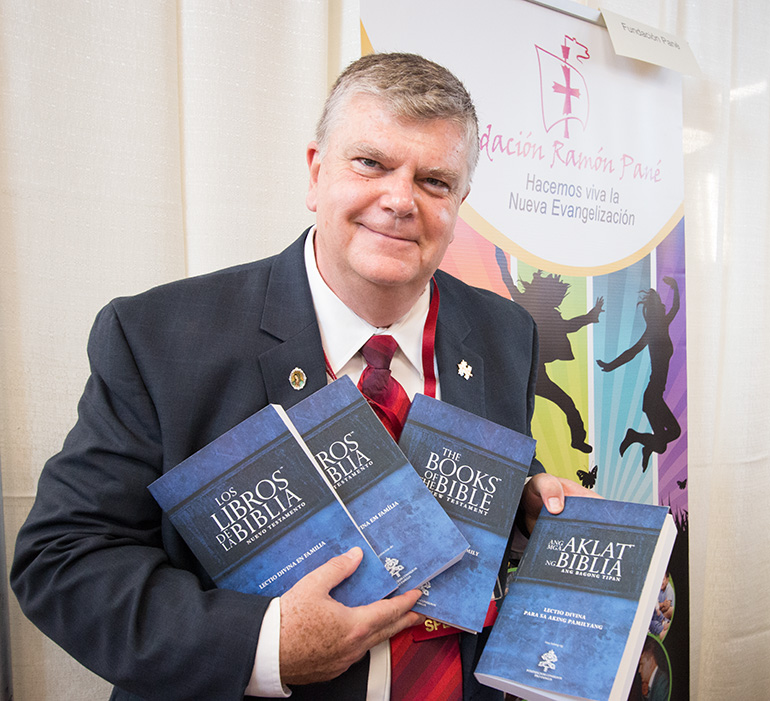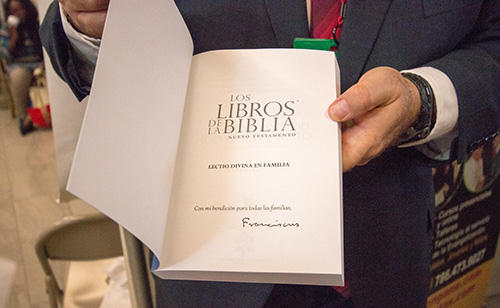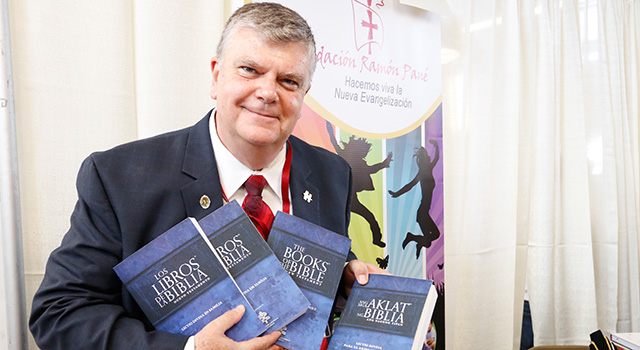By Ana Rodriguez Soto - Florida Catholic newspaper

Photographer: ANA RODRIGUEZ-SOTO | FC
Ricardo Grzona, president and executive director of the Ramon Pane Foundation, holds up the Lectio Divina for Families books that were specifically requested by Pope Francis.
FORT LAUDERDALE | Miami resident Ricardo Grzona can claim a unique relationship with Pope Francis: As Father Jorge Bergoglio, the current pope was Grzona’s spiritual director for nearly 30 years.
“I maintain a very, very close personal relationship” with the pope, said Grzona, a native of Argentina who serves as president and executive director of the Fundación Ramón Pané.
The foundation’s goal is to “make the New Evangelization come alive,” primarily by promoting Lectio Divina ‚Äî a way of reading and praying with the daily scriptures.
Grzona attributes the foundation’s latest project to a request from Pope Francis himself.
“He asked me to adapt all the programs of Lectio Divina for the family,” said Grzona, who was both speaker and exhibitor at this year’s Catechetical Conference, held Oct. 24 at St. Thomas Aquinas High School in Fort Lauderdale.
The foundation has developed an eight-week Lectio Divina program for families that brings them together once a week for about an hour-and-a-half. It is currently available in English, Spanish, Portuguese, Italian and Tagalog, and coming soon in French, Chinese, Hindi, Arabic and Haitian Creole.
Grzona introduced it in Rome Oct. 14, at the World Synod of Bishops on the Family, and got Pope Francis’ autograph along with his endorsement.
“It’s the only book signed by a pope, outside of an encyclical, and we can take pride that it was done in Miami,” said Grzona, referring to the fact that the Ramón Pané Foundation, originally based in Bogotá, Colombia, moved its headquarters here in 2000.

Photographer: ANA RODRIGUEZ-SOTO | FC
Ricardo Grzona, president and executive director of the Ramon Pane Foundation, shows the Lectio Divina for Families book that was autographed by Pope Francis.
The move came at the request of another close collaborator of Pope Francis, Cardinal Oscar Rodriguez Maradiaga of Honduras, whom Grzona met while working for CELAM, the Latin American bishops’ conference.
“Miami is the capital of Latin America,” Grzona explained.
Describing himself as a catechist, he said the new Lectio Divina series is aimed at instilling Christian values in families by filling in the gaps in their knowledge of Christianity.
“We don’t feed ourselves with the Bible. We take bites out of it,” he said, referring to the way most people read the New Testament: at Sunday Mass, in chunks and out of order.
Lectio Divina for the Family offers “a panoramic view of the life of Jesus,” presenting the books of the New Testament in organic order: starting with the Gospel of Luke, which was written for people with no background in Judaism; continuing with the Acts of the Apostles, which were written by Luke, a disciple of Paul, whose letters follow, and so on.
The program was tested earlier this year with 630 families in Mexico, and Grzona said their testimonies of conversion speak to its effectiveness.
In one family, the parents had not spoken to each other in 20 years, even though they lived in the same house. As Catholics, they did not want to divorce. At the behest of one of their children, the whole family embarked on the Lectio Divina readings, gathering once a week via Skype.
Halfway through, “they realized they had spent 20 years without forgiving each other,” Grzona said. “Now, mom and dad not only speak to each other, they love each other. They hug each other in public. They kiss each other in public. To what do they owe this? To being able to pray together.”
In another family, where everything seemed to be going well on a superficial level, the parents came to realize that they had been living in a loveless marriage for 15 years.
“The practice of Lectio Divina does not leave us unchanged. It changes our lives,” Grzona said.
The program’s ultimate goal is to inculcate values in the family, which is why the subtitle in English is “Values for My Virtuous Family.”
While values are intangible, “an ideal to reach for,” Grzona said, Lectio Divina helps families move from those intangible values to lived virtues.
“It’s not about forgiveness. It’s about a person who knows how to forgive. It enables the person to be virtuous in accordance with the values of Christianity that we find in the New Testament,” he said.
That family-centered approach is very much in keeping with the vision behind the Pané foundation, which was founded in 1994 and is named after the “first evangelizer of the Americas,” a layman from Spain who accompanied Columbus on his second trip to the New World.
Pané was present when Columbus returned from his first voyage and presented the Spanish monarchs, Ferdinand and Isabella, with his discoveries ‚Äî including a group of indigenous people.
When he arrived in the Americas, Pané realized the most effective way to evangelize would be to preach the Gospel in the natives’ language, Taino. So he learned it and two years later baptized an entire Taino family in what is now La Vega, Dominican Republic.
They later became evangelizers among their own people — and martyrs for the faith.
“So the first people to be evangelized are a family of Taino Indians. The first Christian martyrs in America are a family of Taino Indians. The first (native) evangelizers were a family,” Grzona said.
That’s precisely the goal of Lectio Divina for families, he added.
“We have to go back to a time when the family is the one that knows the life of Jesus, when the family is transformed by Christian values, and when that transformation renders it virtuous and missionary.”

